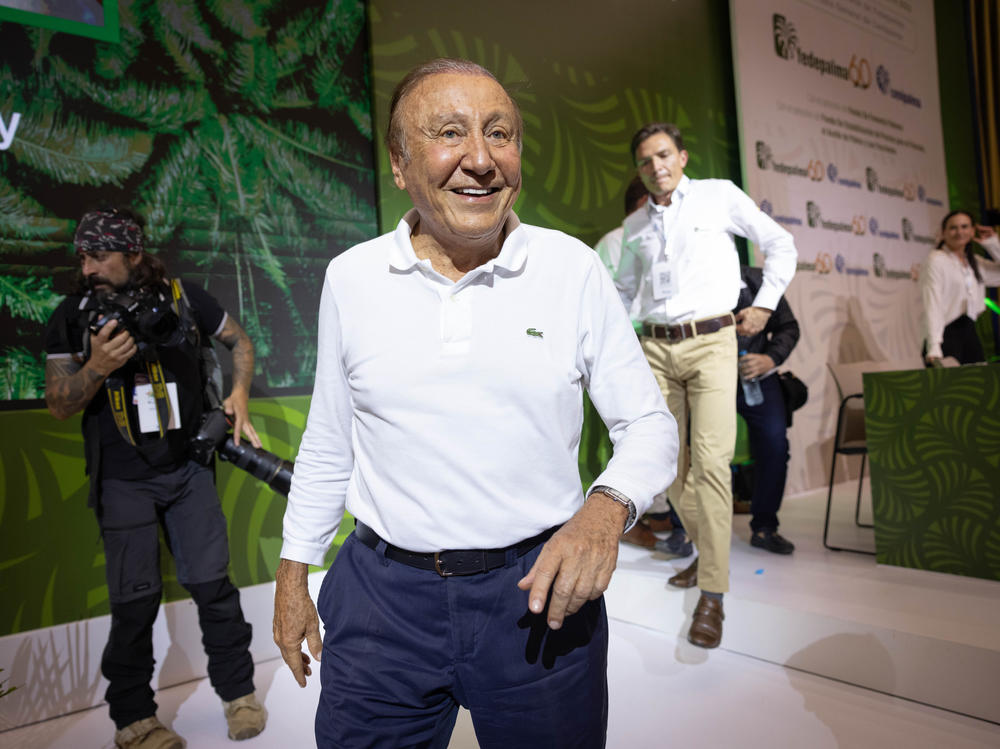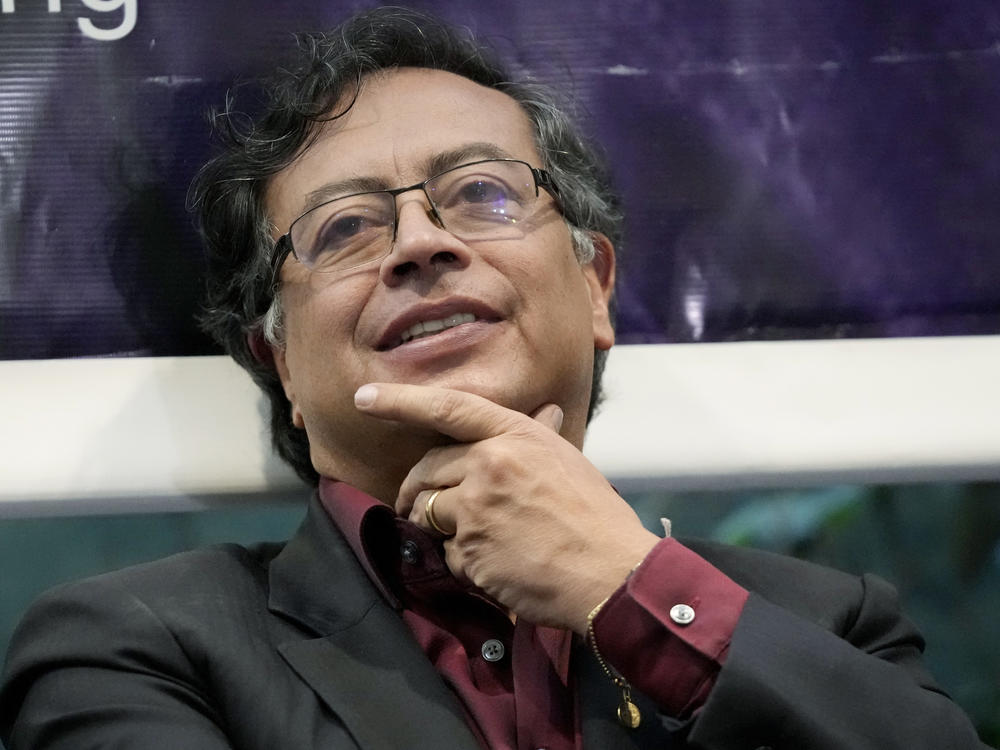Section Branding
Header Content
After Colombia's election surprise, a populist TikTok star poses stiff competition
Primary Content
BOGOTÁ, Colombia — In a shock to a political system long dominated by traditional parties and machine politics, an eccentric, 77-year-old populist who promises drastic budget cuts and jail for corrupt officials is now leading the race for the presidency.
Unknown to most Colombians until just a few months ago, Rodolfo Hernández, a real estate mogul and a former mayor, garnered enough votes in the May 29 first-round election to earn a spot in Sunday's runoff against leftist Gustavo Petro.
The latest polls show Hernández neck and neck with Petro, a former guerrilla fighter and veteran politician who had been the clear front-runner all year long.
"Thank you, Colombians," Hernández said in a video message to his supporters after beating four other candidates and finishing runner-up to Petro in the first round of voting. "I am counting on you to win the runoff."
The video, shot from Hernández's kitchen with appliances and a pot-filled stove in the background, was in keeping with his austere image. Although Hernández earned millions in real estate, he says he's not spending much on his campaign.
You might find Rodolfo Hernández on TikTok
Rather than barnstorming the country giving speeches, he communicates via TikTok videos and softball interviews, usually focusing on government graft, which he claims is the root of Colombia's problems. In a recent interview on Colombian TV, he said that nearly all politicians were "traitors, liars, clowns and hypocrites and we are going to kick them out."
If he wins, he plans to hold a simple inaugural in a poor town, saying normal swearing-in ceremonies at the presidential palace with hundreds of guests waste taxpayer money on caviar, Champagne and whisky. Despite his age, Hernández says he will be on the job from dawn until dusk to cram 5 1/2 years of work into a four-year presidential term.
"Colombia is a beautiful country that has been run by thieves," he said in the TV interview, "and the results have been fatal."
Gustavo Petro aims to be the first leftist president
Hernández's rival, Petro, is trying to become Colombia's first-ever left-wing president. Thus, no matter who wins, the incoming leader will take the country in a new direction. All this, according to analysts, is the result of decades of corruption and unkept promises by traditional politicians as well as the COVID-19 pandemic that threw millions of Colombians into poverty.
However, 62-year-old Petro is a former Bogotá mayor and a longtime opposition senator who is on his third run for the presidency. Compared to Hernández, he is old news, says Lawrence J. Gumbiner, a former U.S. diplomat who has advised Hernández on international affairs.
The feeling among many voters, Gumbiner says, is that "all these guys who have been around all these years, we don't like any of them. We don't really know who this guy [Hernández] is but we're so sick of everybody who has been around all these years that we are willing to roll the dice on him."
Adding to Hernández's rise is lingering fear of Petro. Business leaders are worried about Petro's plans to gradually phase out the production of oil, the country's main export, to renegotiate trade deals with countries like the United States, and reform the pension system. Petro has also pledged to forge closer ties to the authoritarian regime in neighboring Venezuela.
Hernández got endorsements, including from rival candidates
Partly as a result, Hernández has received a wave of endorsements from establishment parties and politicians, including Federico Gutiérrez. He was the conservative, pro-government candidate who finished third in the May 29 vote. He claims Petro could become a leftist dictator, like Venezuela's Nicolás Maduro, and in his concession speech he urged Colombians to back Hernández.
"We have to save liberty and democracy because once they are gone, they don't come back," Gutiérrez warned.
But critics claim that Hernández harbors an authoritarian streak.
He has praised President Nayib Bukele of El Salvador for ordering army troops to occupy that country's Congress building in 2020 to intimidate legislators into supporting his policies. Hernández lacks a majority in Colombian Congress but said he would put up billboards of allegedly corrupt lawmakers and shame them into supporting his agenda.
In addition, he refuses to face the scrutiny of televised debates or hard-hitting journalists, preferring to communicate directly with voters through social media.
"His Achilles' heel is his populist tendencies and his appreciation for the strongman style of governance," Gumbiner says.
Hernández's headstrong approach was on full display in 2018 when he was mayor of the northern city of Bucaramanga, the only important political post he has held. He was caught on video screaming at a city councilman — and then slapping him — in an argument over corruption.
Indeed, for all his talk of clean government, Hernández himself is facing corruption charges over a public works contract from his time as mayor in a case set to go to trial in July — just weeks before the new president will be sworn in.
In a May 29 speech, Petro told his supporters: "My opponent is accused of corruption. Do we want that? You don't fight corruption by sending out messages on TikTok."
Hernández has also made some stunning gaffes. In a radio interview last year, for example, he said he is a "follower of a great German thinker named Adolf Hitler," but later clarified that he meant Albert Einstein, saying he has no love for the Nazi ruler. In video message to voters in Vichada, a remote department in eastern Colombia that borders Venezuela, he asked his interviewer: "Vichada? What's that?" Yet he still won the most votes in Vichada in the first round of voting.
Ideologically, Hernández is hard to pin down. He's pro-business but also supports abortion rights, same-sex marriage and drug legalization and backs Colombia's 2016 peace treaty that disarmed the country's largest guerrilla group. Yet he's failed to flesh out his proposals on everything from national security to the economy.
However, many Colombians are drawn more to Hernández's style than his substance. Among them is Marco Moreno, who runs a bike shop on the outskirts of Bogotá.
Hernández "is very firm in his decisions," Moreno says. "He's radical. And that's what's good about him."
Copyright 2022 NPR. To see more, visit https://www.npr.org.


